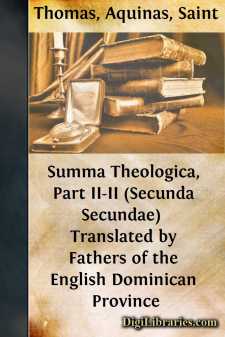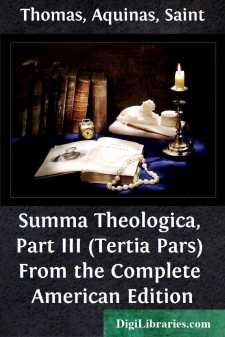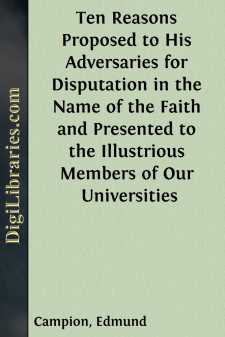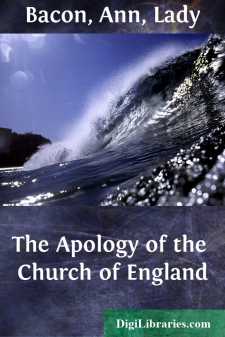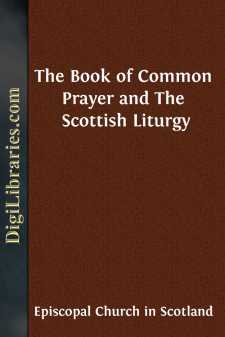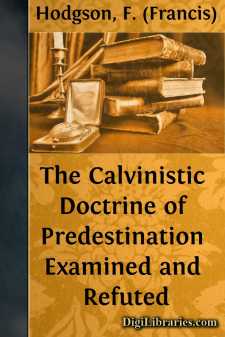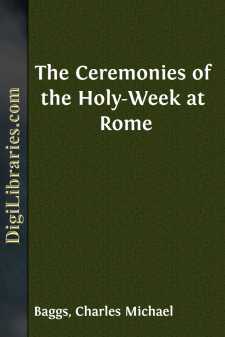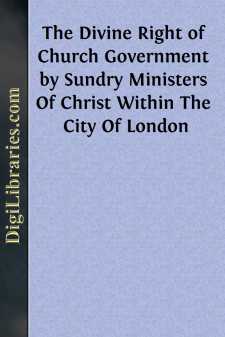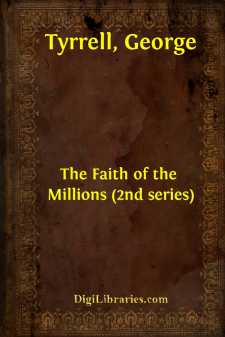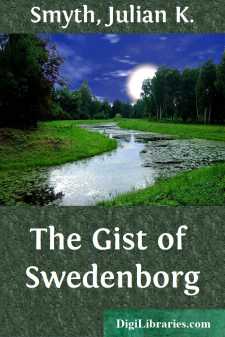Religion
- Agnosticism 2
- Antiquities & Archaeology 21
- Atheism 12
- Biblical Criticism & Interpretation 15
- Biblical Meditations 3
- Biblical Reference 1
- Biblical Studies 11
- Buddhism 8
- Christian Church
- Christian Education 5
- Christian Life 26
- Christianity 60
- Cults 2
- Devotional 6
- Eastern 2
- Education 4
- Eschatology 1
- Ethics 3
- General 60
- Gnosticism 1
- Hinduism 15
- History 28
- Holidays 10
- Inspirational 1
- Islam 8
- Judaism 3
- Leadership 1
- Meditations 3
- Monasticism 1
- Mysticism 11
- Philosophy 4
- Prayer 26
- Prayerbooks 5
- Religion & Science 12
- Sermons 54
- Spirituality 53
- Theism 2
- Theology 17
- Theosophy 15
Christian Church Books
Sort by:
by:
Aquinas Thomas
TREATISE ON THE THEOLOGICAL VIRTUES (QQ. 1-46) _______________________ QUESTION 1 OF FAITH (In Ten Articles) Having to treat now of the theological virtues, we shall begin withFaith, secondly we shall speak of Hope, and thirdly, of Charity. The treatise on Faith will be fourfold: (1) Of faith itself; (2) Of the corresponding gifts, knowledge and understanding; (3) Of the opposite vices; (4) Of the...
more...
by:
Aquinas Thomas
In a few places, where obvious errors appeared in the Benziger Brothers edition, I have corrected them by reference to a Latin text of the Summa. These corrections are indicated by English text in brackets. For example, in Part I, Question 45, Article 2, the first sentence in the Benziger Brothers edition begins: "Not only is it impossible that anything should be created by God…." By...
more...
by:
Edmund Campion
1. THE SIGNIFICANCE OF THE Decem Rationes. The chief point to remember is that the Decem Rationes was the last and most deliberate free utterance of Campion's ever-memorable mission. During the few months that mission lasted he succeeded in staying the full tide of victorious Protestantism, which had hitherto been irresistible. The ancient Church had gone down before the new religion, at...
more...
by:
Ann Bacon
INTRODUCTION. The great interest of Jewel’s “Apology” lies in the fact that it was written in Latin to be read throughout Europe as the answer of the Reformed Church of England, at the beginning of Queen Elizabeth’s reign, to those who said that the Reformation set up a new Church. Its argument was that the English Church Reformers were going back to the old Church, not setting up a new; and...
more...
THE PREFACE It hath been the wisdom of the Church of England, ever since the first compiling of her Public Liturgy, to keep the mean between the two extremes, of too much stiffness in refusing, and of too much easiness in admitting any variation from it. For, as on the one side common experience sheweth, that where a change hath been made of things advisedly established (no evident necessity so...
more...
DISCOURSE I. “In whom also we have obtained an inheritance, being predestinated according to the purpose of him who worketh all things after the counsel of his own will.”—Eph. i. 11. It would very naturally be expected of a preacher, selecting this passage as the foundation of his discourse, that he would have something to say upon the subject of predestination. It is my purpose to make this the...
more...
CHAP. I. ON THE CEREMONIES OF THE MASS CONTENTS. Origin of the word ceremony—object of ceremonies—institution of the mass—its earliest ceremonies—discipline of secrecy—liturgy of the Roman church—general review of the principal ceremonies of the mass—mass of the catechumens, ambones—mass of the faithful, blessed water, secrecy, prayers for the dead—Latin the language of the Roman...
more...
by:
Unknown
CHAPTER I. That there is a Government in the Church of DIVINE RIGHT now under the New Testament. Jesus Christ our Mediator hath the government (both of the Church, and of all things for the Church) laid upon his shoulder, Isa. ix. 6, and to that end hath all power in heaven and earth given to him, Matth. xxviii. 18, John v. 22, Ephes. i. 22. But lapsed man (being full of pride, Psal. x. 2, 4, and...
more...
by:
George Tyrrell
XIII. JULIANA OF NORWICH. "One of the most remarkable books of the middle ages," writes Father Dalgairns, [1] "is the hitherto almost unknown work, titled, Sixteen Revelations of Divine Love made to a Devout Servant of God, called Mother Juliana, an Anchoress of Norwich" How "one of the most remarkable books" should be "hitherto almost unknown," may be explained partly...
more...
by:
Julian K. Smyth
ONE AND INFINITE God is One, and Infinite. The true quality of the Infinite does not appear; for the human mind, however highly analytical and exalted, is itself finite, and the finiteness in it cannot be laid aside. It is not fitted, therefore, to see the Infinity of God, and thus God, as He is in Himself, but can see God from behind in shadow; as it is said of Moses, when he asked to see God, that he...
more...


